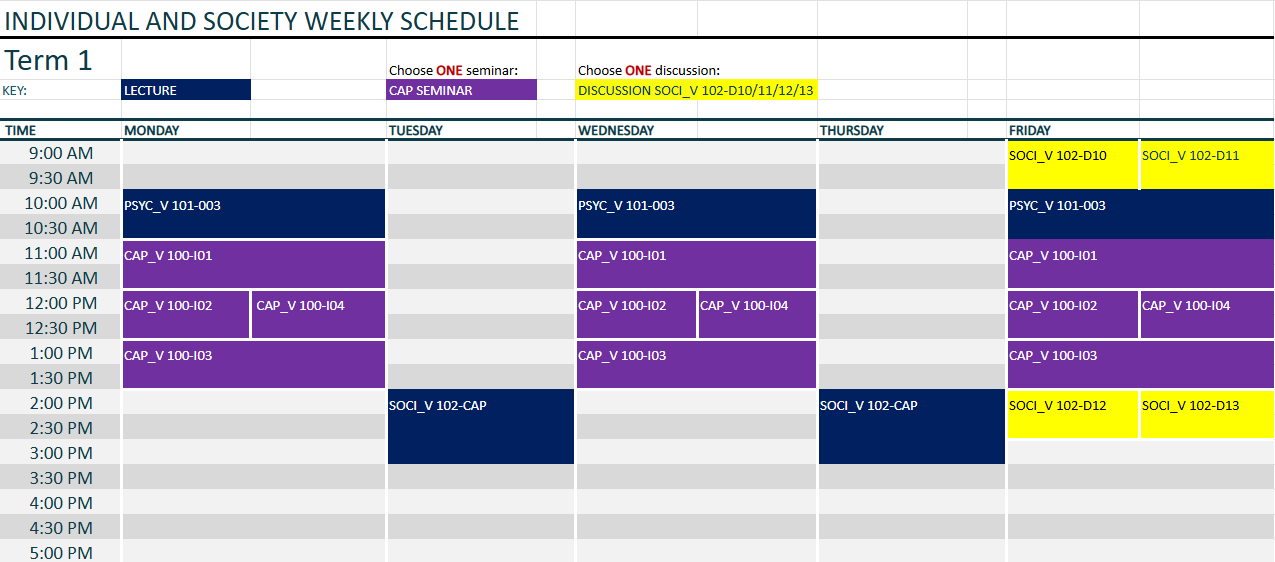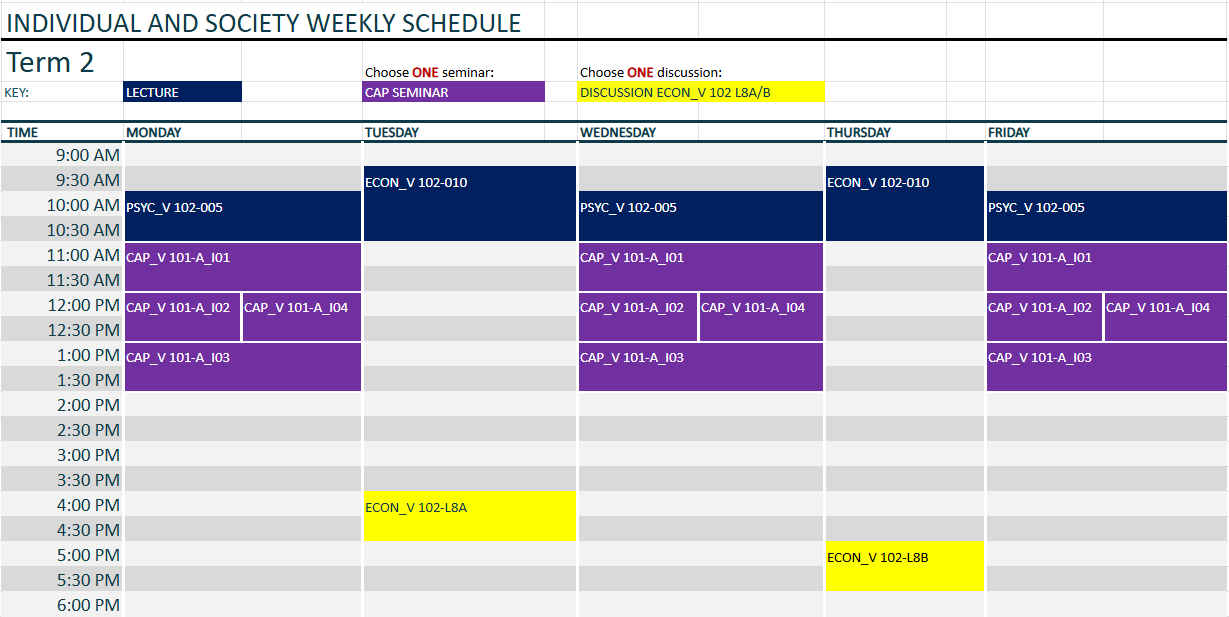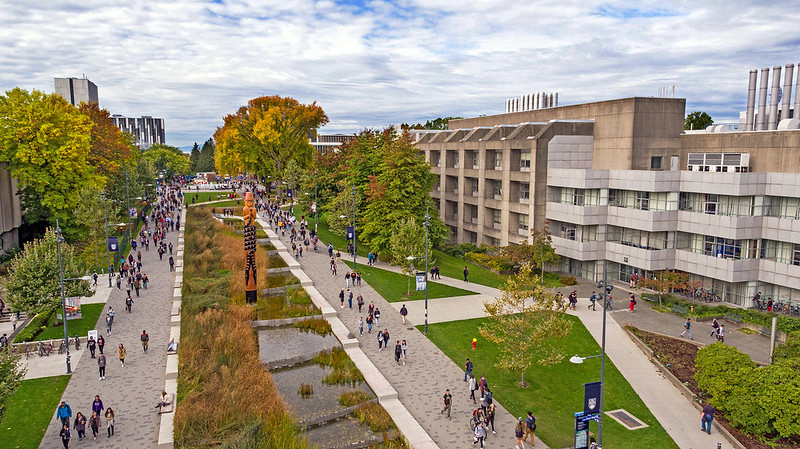In this stream, students will consider the relationship between the individual and society. This will build the groundwork for many of the most popular majors at UBC including Psychology, Economics, Commerce, Sociology, and English.
This stream offers a foundation for understanding, researching, and writing about the relationships between people and the worlds they inhabit. Our approach considers economic and business policies, social and psychological phenomena, technological innovation, pop culture, and social justice.
This stream is ideal for first-year students interested in majoring in Psychology, Economics* or Sociology. It also suits students entering into an interdisciplinary major, or who are unsure of their major but want to develop a broad and flexible range of scholarly abilities in preparation for the rest of their academic career.
Individual & Society students develop skills for critical thinking, academic writing, and research across disciplines as they prepare to be the influencers and leaders of the future.
*Please note that students interested in majoring in Economics should take ECON 101 as an elective outside of CAP in Term 1 or consider CAP’s PPE stream (which offers ECON 101 in Term 1). This stream only offers ECON 102 (Term 2).
Courses: Term One
In the first term, students will enrol in CAP 100, Sociology, and Psychology. In CAP 100, you will be introduced to the research practices and features of academic writing at the university level. Biological psychology seeks to explain individual actions by delving into the inner workings of a person’s mind. In Sociology, students will learn how societies work together towards a more just, fair and sustainable society for all individuals.
Analysis of and practice in academic research and writing in the social sciences and the humanities. Restricted to students in the Coordinated Arts Program. Credits count toward the Writing Component of the Faculty of Arts Writing and Research Requirement.
This course is not eligible for Credit/D/Fail grading.
For more information about the connections between CAP 100 and CAP 101A, please visit this page.
CAP_V 100-I01 (MWF 11am-12pm) - Instructor: Dr. Moberley Luger
All the Feels: Writing, Research, and the Cultural Politics of Emotions.
Emotions are often understood as innate in our bodies, a topic to be studied by Psychologists. But emotions are also felt collectively; they are shaped by culture and shape it. In this class, as we practice being cultural critics – academically trained researchers and writers – we will study the cultural politics of emotions. Books and movies teach us that we should be cringe at certain kinds of people. They tell us who looks like a good guy or a “bad guy.” We will watch some tv (Veep, Love on the Spectrum), read some theory (Judith Butler on what makes a life grievable) and academic articles, as we learn to think discuss, and write about emotions as university critics.
PSYC_V 101-003 (MWF 10-11) - Instructor: Dr. Mark Lam
Introduction to Methods and Statistics, Biopsychology, Learning, Perception, Memory, and Cognition. Credit will be granted for only one of PSYC 100 and PSYC 101.
Courses: Term Two
In their second term, students will continue their studies in CAP 101A and Psychology, and take an Economics course. Bringing our focus from the individual to the society, macroeconomics will highlight the ways that we study economic behaviour on a larger societal scale. The study of social and personality psychology will also help us to explain how society might shape an individual’s personality and behaviour.
Applications of research and writing skills in the context of literary, cultural, and media analysis. Topics integrate CAP stream themes and vary each year. Restricted to students in the Coordinated Arts Program.
This course is not eligible for Credit/D/Fail grading.
For more information about the connections between CAP 100 and CAP 101A, please visit this page.
CAP_V 101-A_I01 (MWF 11am-12pm) - Instructor: Dr. Moberley Luger
All the Feels: Reading, Research, and the Cultural Politics of Emotions.
This class will build on both the topics (emotions) and the skills (research and writing) from CAP 100-I01 as we practice our own media, literary, and cultural, analysis. We will read books (Michelle Good’s Five Little Indians) and listen to music (Taylor Swift’s Tortured Poet’s Department) as we explore the cultural production of feelings like empathy, and love. We will participate in a local community based learning project and practice both scholarly and public-facing writing.
ECON_V 102-010 (TTh 9:30-11) - Instructor: Dr. Emrul Hasan
Elements of theory and of Canadian policy and institutions concerning the economics of growth and business cycles, employment, national income accounting, interest and exchange rates, money and banking, the balance of trade. Credit will be granted for only one of ECON_V 102 or ECON_V 311. Equivalency: ECON_V 311
PSYC_V 102-005 (MWF 10-11) - Instructor: Dr. Mark Lam
Introduction to methods and statistics, motivation, assessment, developmental, personality, clinical, and social psychology. Credit will be granted for only one of PSYC 100 and PSYC 102.
Courses: Schedule
Preview how a week looks in the stream:
Sample Projects
Cities of the Future
Thinking about and imagining urban futures has become the focus of artistic expression, academic research projects, conferences, city planning agendas, and corporate think tanks. The goal of this assignment is to demonstrate understanding of academic writing and qualitative research as activities with the potential to create change in the world around us. The assignment asks students to respond to this prompt: “The year is 2223. You live in a Vancouver that few citizens of 2023 would recognize. You have invented a new form of time travel that allows you to send not people, but messages, back through time. In 2000 words, describe your Vancouver to the Vancouver citizens living in 2023, and explain to them how their society can achieve or avoid this future.”
Short Group Presentations: Selling Our School
This assignment, a short group presentation, approaches concepts from authors and critics in the course from a localized point of view, examining how the shared space of our university is branded, bought, and sold. This narrow focus creates opportunities for students to draw from first- hand knowledge as inhabitants of this institution: site-specific presentations and field trips around campus are encouraged!. Students select one topic, site, or commodity in tandem with one research question or “thesis.” This research question specifically addresses a cultural issue under discussion as it relates to individual social experience on campus, focusing explicitly on commodification and the course theme of “culture on sale.”
On-line experiments
On-line experiments, conducted on three selected evenings during the term, give students the opportunity to participate in real-time, online markets with their classmates and the professor. These experiments help students understand how real markets operate, how they organize the economic activity of disparate consumers and businesses, and how the market collects and processes information. Students are assigned a variety of roles to play in each experiment and their success as market participants becomes a (small) part of their overall course grade.
Article Report
A psychological research article is assigned for students to read and summarize during Term 1. Each student writes a short article report summarizing and critiquing the article. Students are welcome to work in groups when discussing the article report, but the paper is written independently.
Group Project
During Term 2, students (working in teams of 2 or 3) conduct their own psychological experiment on an assigned topic. Students are responsible for designing and conducting the experiment and submitting a report.


